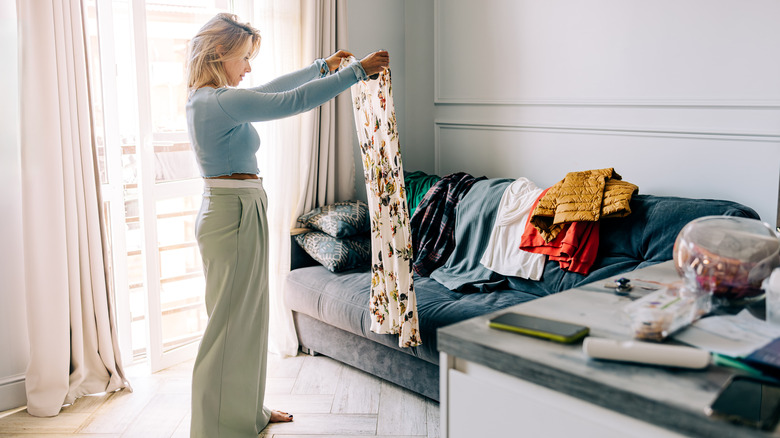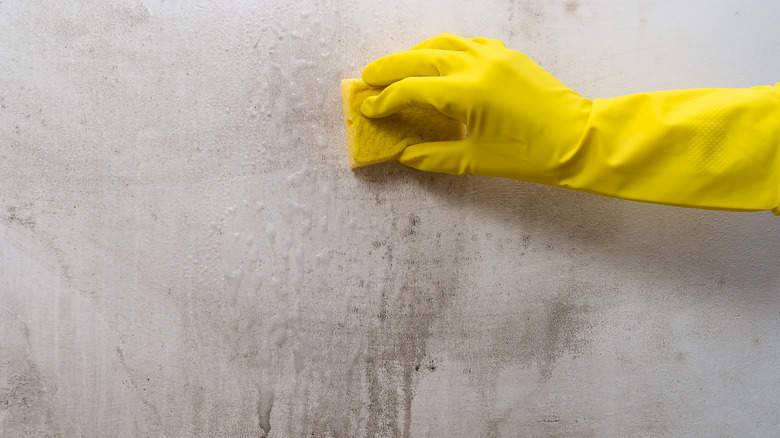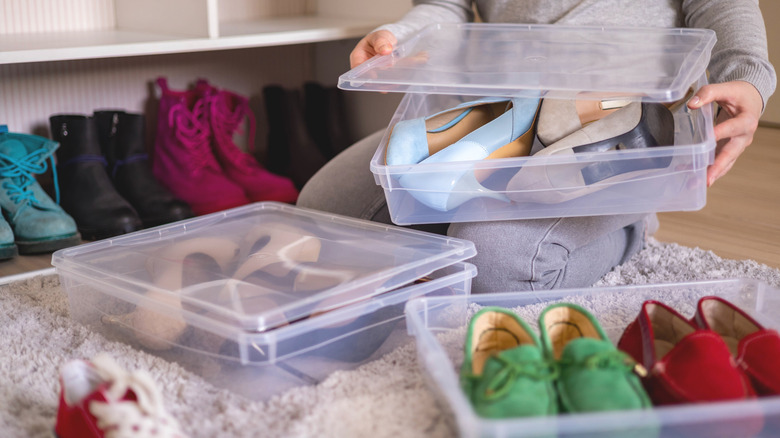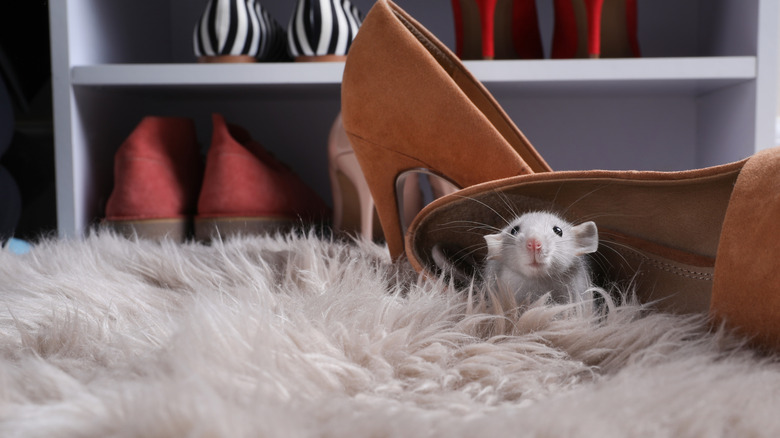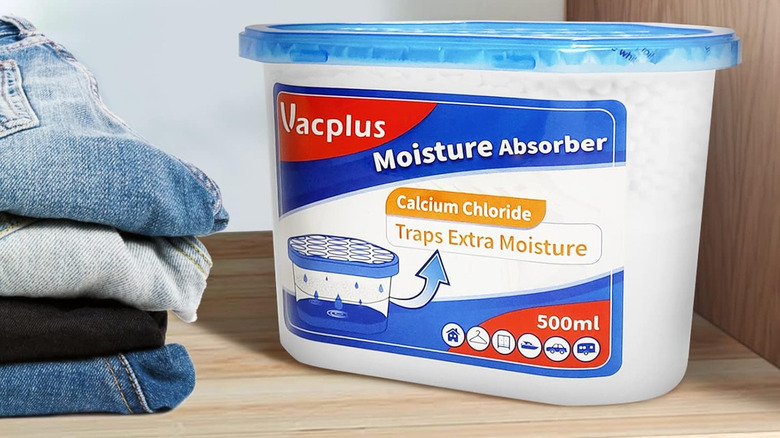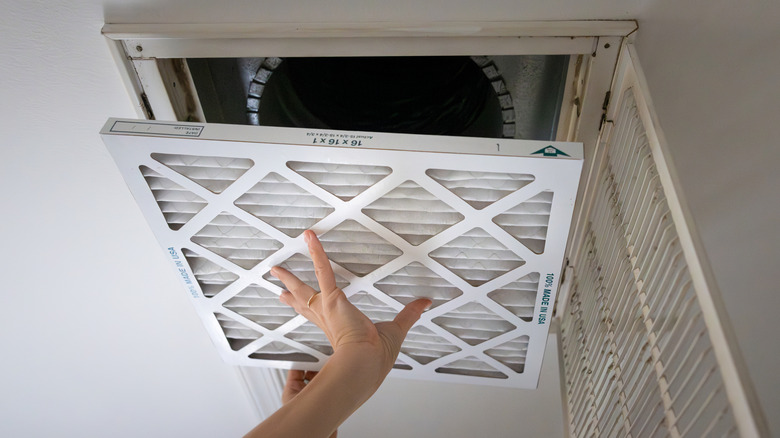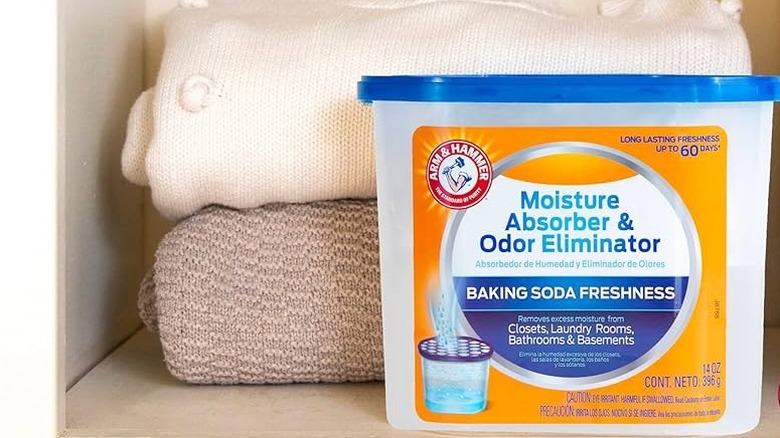Simple Tips And Tricks That Will Banish Musty Closet Smells For Good
We may receive a commission on purchases made from links.
Musty closet smells are one of those sneaky home nuisances that creep up on you over time. You might not even notice it at first, until one day you open the door and bam! Your nose tells you something's not right. Whether it's from dampness, forgotten shoes, pests moving in, or just stale air, musty odors have no place in your clean, cozy home. Luckily, getting rid of that lingering household odor (and keeping it gone) is a lot easier than you might think.
Closets can be tricky spaces to keep smelling good. They're enclosed, dark, and often packed with fabrics that love trapping moisture and odors, so it's not unusual for them to start smelling a bit funky over time. But with the right approach, you can turn even the mustiest closet into a clean, pleasantly scented space you won't mind reaching into every day. These are a few simple, tried-and-true (and science-backed!) tips to freshen up your closet. This way, you can pinpoint what's causing the stink, clean things up the right way, and introduce a few preventative tricks that actually work. In fact, most of these tips can be implemented in one afternoon with a little elbow grease and one trip to the store.
Pull everything from the closet to identify bad-smelling clothes
The best place to start with a closet that smells a bit musty is to take everything out of it. It's a bit like starting the KonMari organizing method. But instead of deciding if something sparks joy before you put it back in or toss it out, you just have to decide if it smells bad or not. If your closet stinks, it's possible there is something in the closet already that's the source. One trip to the dry cleaners later, and the problem might be fixed. By taking everything out like this, you can also determine if it's the closet itself that smells bad instead of what's in it.
Pull out all the drawers and look behind shelves, too, as sometimes things drop down and hide from view. Next, once everything is laid out, give it all a good sniff test before putting it back in. If you find a pair of shoes that are particularly grody, or an old coat that smells off, you can give them a good cleaning before they go back in. In most cases, there's usually more than one culprit, which is why it's so important to take everything out.
Investigate for mold, mildew, or rot
This trick should be combined with the first tip: While you have everything out of the closet, but before you begin going through each item, take the time to inspect the bones of the closet as well. Give the floor a good vacuum and wipe shelves down with antibacterial wipes like the Clorox disinfecting wipes value pack, or a 50-50 vinegar-water solution to kill bacteria and mildew. While cleaning, watch for signs of damage that can cause musty smells, like water spots, mold growing on the walls, etc. These things might be cause for hiring a professional to take care of them.
Mildew removal might be an easy DIY, but mold can cause serious illness in addition to making the entire closet smell, and typically requires a professional. If there is mold growing on your clothes, or the walls, it could point towards a larger problem. In fact, these are signs that there is even more hidden mold in other parts of your closet, like underneath wallpaper or inside the walls themselves. In some cases, excess moisture might even cause wooden elements in the closet to begin to rot, giving the entire space that damp, musty smell. Identifying and replacing these parts of your closet, perhaps with metal options, like the Supforce adjustable metal closet rod, could prevent further rot once the initial piece is taken out.
Keep wet and dirty items outside of the closet
Closets are enclosed spaces, so anything that traps moisture or gives off odors can quickly create that musty, unpleasant atmosphere you worked so hard to get rid of. For instance, shoes (particularly athletic shoes, boots, or sandals worn without socks) can trap sweat and moisture. If placed inside without cleaning or airing them out, they can silently become the source of strong odors. One solution is to store shoes in clear shoe boxes with ventilation holes, like the Baleine 12 pack stackable shoe storage boxes, to keep them a bit separate from the rest of the closet. You can also sprinkle baking soda with a few drops of essential oil in shoes as a natural two-ingredient air freshener. Or spray something like Dr. Scholl's Odor-X ultra odor-fighting powder spray to get rid of the rankness. There is also an inexpensive device that will dry out your shoes, so sweat doesn't have time to stink up the closet — the MingTing shoe dryer.
Sometimes it's not the shoes that stink, just all of your dirty laundry. Depending on how often you do laundry, the stink of clothes waiting for their turn can start to impact the rest of the space. In this case, a laundry bin with a lid can keep smells contained, like the efluky narrow laundry hamper with removable bag. Or, store your hamper in the laundry room, which might air out more rapidly than a closet.
Make sure there are no mice or other pests lurking around
Sometimes the musty smells wafting from your closets are because pests have made their home inside. Mice stink, and cockroaches smell, too. Having either of them living alongside your clothes and Christmas decorations is a recipe for disaster. If you think your closet is beginning to smell a bit like ammonia, it probably means mice are using the toilet, as that comes from their urine. If it's combined with a musk, or eventually starts to smell a bit like a fish market, it means there is also a mouse nest nearby. The household items mice use to make their nests start to smell like this after a bit of use. If this is the case, it's time to get rid of the mice humanely. Sealing up any perceived entry points and disposing of their nests is a great place to start.
Cockroaches also have a nasty, musty smell. This stink is a combination of bacteria in their feces, plus actual oils on the roaches themselves. They love nesting in dark, moist, undisturbed spots, something the deepest reaches of your closet may be full of. If you see markings that look like coffee grounds in your closet, that's their waste, meaning it's a roach issue causing the smell. If so, you might not want to use chemicals in such close contact with your belongings. Studies show that cinnamon oil can be a natural alternative to chemical pesticides in deterring roaches.
Control moisture levels to prevent dampness
Often, excess levels of humidity are the cause of the musty smell in your closet. All the excess moisture in the air makes it so nothing is ever completely dry, leading to bad smells. A simple hack to test for this is to fill a small glass with tap water. Place three medium ice cubes inside and leave the glass in the closet, with the door closed, for about five minutes. If there is already condensation on the outside, it's too humid in there! DampRid moisture detection strips will also do the trick if you want a more precise way to check the levels.
Luckily, there are plenty of ways to reduce humidity levels in your closet, helping it smell better. First, you might consider simply leaving the door open from time to time. If there isn't an air vent inside, the fresh, temperature-controlled air from the rest of your house might even things out. You can also place a dehumidifier inside. Finally, consider using silica-based moisture absorbers. There are bags that hang, like the CLEVAST moisture absorbers packets as well as tubs that can sit on shelves, like the Vacplus moisture absorbers 6 pack, These are great solutions if the closet itself doesn't have a bigger underlying issue (like a hidden leak), and you're simply looking to manage excess humidity in the air.
Add ventilation if possible
If you're open to some light construction, installing a vent can make a big difference in keeping your closet smelling fresh. A passive vent that connects to an adjacent room can help with air circulation, but for best results, you might consider tying the closet into your home's HVAC system to introduce consistent airflow. This can help prevent the kind of stagnant air that allows odors and mildew to take hold. While there are DIY options available, for most homeowners — especially where ductwork or electrical elements are involved — it's safest and most effective to consult a professional. An HVAC technician can look at your system and suggest the best way to add fresh air into your indoor space without wasting energy or reducing air quality.
You can also just add a fan. It's a much easier DIY solution that doesn't require any renovation. Consider a smaller fan to sit on a shelf, like the Amazon Basics air circulator fan, or a larger standing fan for walk-in closets that have the space, like the Dreo tower fan. A quick note: Most closets do not have power outlets, so you might need to run an extension cord inside for the fan to work. In this case, a ZhiYo wire cover for two cords can prevent it from becoming a tripping hazard.
Use odor absorbing powders like baking soda and activated charcoal
Odor-absorbing powders like baking soda and activated charcoal are all-natural items to stop that damp smell in your closet. Baking soda (sometimes called sodium bicarbonate) works because it's a base. When it reacts with bad smells (typically acidic) it forms compounds that aren't volatile, so have no scent. Activated charcoal works because it has lots of tiny holes (it's very porous). Essentially, these holes work as traps for the chemicals that create bad smells. Once this happens, you can't really smell them anymore.
You don't need open bowls of baking soda or activated charcoal inside your closet, as that's just a recipe for a spill. Instead, purchase both powders in containers. They are still effective; they just won't make a mess. For example, you can hang the bamboo air purifying bag from Vitscan, which uses activated charcoal, in multiple spots around your closet, as it comes in a pack of 12. You can also buy Arm & Hammer fragrance-free moisture absorber and odor eliminator, which helps with the moisture problem along with the smell in a useful one-two punch.

